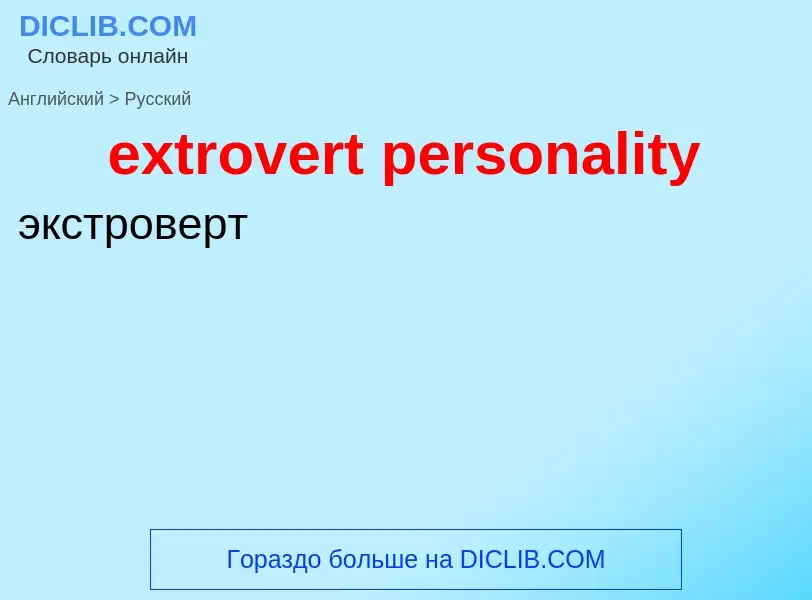Μετάφραση και ανάλυση λέξεων από τεχνητή νοημοσύνη
Σε αυτήν τη σελίδα μπορείτε να λάβετε μια λεπτομερή ανάλυση μιας λέξης ή μιας φράσης, η οποία δημιουργήθηκε χρησιμοποιώντας το ChatGPT, την καλύτερη τεχνολογία τεχνητής νοημοσύνης μέχρι σήμερα:
- πώς χρησιμοποιείται η λέξη
- συχνότητα χρήσης
- χρησιμοποιείται πιο συχνά στον προφορικό ή γραπτό λόγο
- επιλογές μετάφρασης λέξεων
- παραδείγματα χρήσης (πολλές φράσεις με μετάφραση)
- ετυμολογία
extrovert personality - translation to ρωσικά
медицина
параноидная личность
медицина
эмоционально зависимая личность
Ορισμός
I'm only after girls with nice personalities. Yeah, look at the personalities on her
Βικιπαίδεια

A personality test is a method of assessing human personality constructs. Most personality assessment instruments (despite being loosely referred to as "personality tests") are in fact introspective (i.e., subjective) self-report questionnaire (Q-data, in terms of LOTS data) measures or reports from life records (L-data) such as rating scales. Attempts to construct actual performance tests of personality have been very limited even though Raymond Cattell with his colleague Frank Warburton compiled a list of over 2000 separate objective tests that could be used in constructing objective personality tests. One exception however, was the Objective-Analytic Test Battery, a performance test designed to quantitatively measure 10 factor-analytically discerned personality trait dimensions. A major problem with both L-data and Q-data methods is that because of item transparency, rating scales and self-report questionnaires are highly susceptible to motivational and response distortion ranging all the way from lack of adequate self-insight (or biased perceptions of others) to downright dissimulation (faking good/faking bad) depending on the reason/motivation for the assessment being undertaken.
The first personality assessment measures were developed in the 1920s and were intended to ease the process of personnel selection, particularly in the armed forces. Since these early efforts, a wide variety of personality scales and questionnaires have been developed, including the Minnesota Multiphasic Personality Inventory (MMPI), the Sixteen Personality Factor Questionnaire (16PF), the Comrey Personality Scales (CPS), among many others. Although popular especially among personnel consultants, the Myers–Briggs Type Indicator (MBTI) has numerous psychometric deficiencies. More recently, a number of instruments based on the Five Factor Model of personality have been constructed such as the Revised NEO Personality Inventory. However, the Big Five and related Five Factor Model have been challenged for accounting for less than two-thirds of the known trait variance in the normal personality sphere alone.
Estimates of how much the personality assessment industry in the US is worth range anywhere from $2 and $4 billion a year (as of 2013). Personality assessment is used in wide a range of contexts, including individual and relationship counseling, clinical psychology, forensic psychology, school psychology, career counseling, employment testing, occupational health and safety and customer relationship management.


